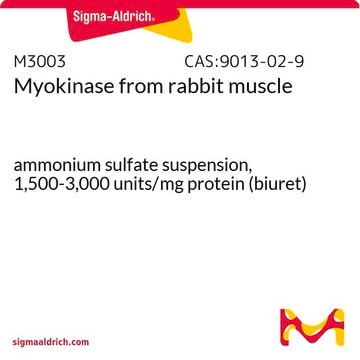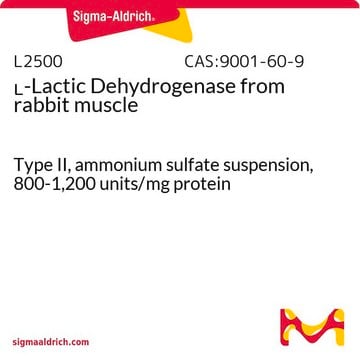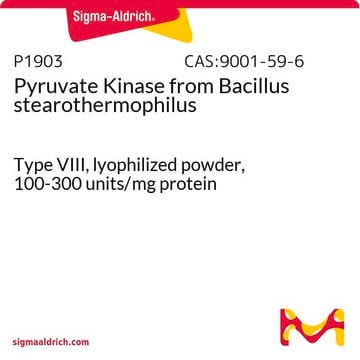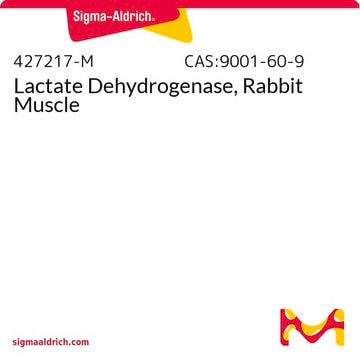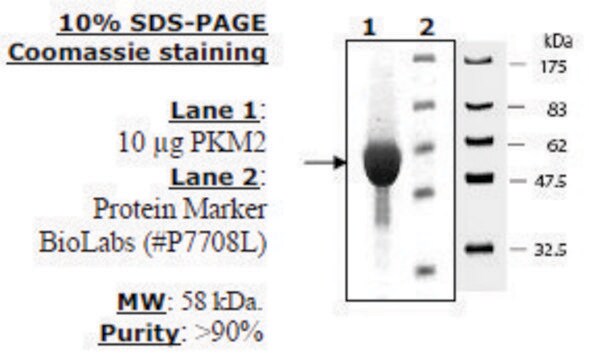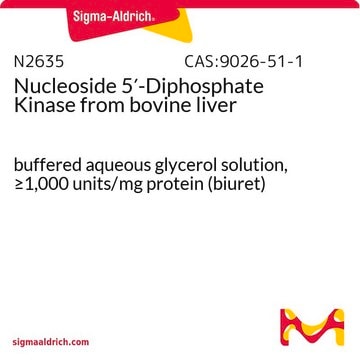P9136
Pyruvate Kinase from rabbit muscle
Type III, lyophilized powder, 350-600 units/mg protein
Sinónimos:
ATP:pyruvate 2-O-phosphotransferase, PK
Iniciar sesiónpara Ver la Fijación de precios por contrato y de la organización
About This Item
Productos recomendados
biological source
rabbit muscle
Quality Level
type
Type III
form
lyophilized powder
specific activity
350-600 units/mg protein
mol wt
237 kDa
foreign activity
lactic dehydrogenase, creatine phosphokinase, phosphoglucomutase, and myokinase ≤0.01%
storage temp.
−20°C
¿Está buscando productos similares? Visita Guía de comparación de productos
General description
Pyruvate Kinase (PK) is a glycolysis enzyme and has four isozymes L, R, M1, and M2. The L isozyme is localized in gluconeogenic tissues, particularly in the liver. Whereas the R and M1 are localized in the adult skeletal muscles, heart, brain and erythrocytes, respectively. M2 is localized in the nucleus of the cells.
Application
Pyruvate Kinase from rabbit muscle has been used to convert adenosine diphosphate (ADP) to adenosine triphosphate (ATP) in Pseudomonas putida cells.
Pyruvate kinase has been used in plant spectrophotometric assays to measure ATP hydrolysis . Pyruvate kinase is also used to study pyruvate kinase (PK) deficiency .
Biochem/physiol Actions
Molecular Weight: 237 kDa and exists as a tetramer of four equal subunits of molecular weight 57 kDa.
Isoelectric Point: 7.6
Optimal pH: ∼7.5
Optimal Temperature: 25°C
ΕA280 = 0.54 for 1 mg(p)/ml, 1 cm path
Reported KM values are ATP (0.86 mM), pyruvate (10 mM), ADP (0.3 mM), and PEP (0.07 mM) in Tris buffer at pH 7.4 and 30 °C. Pyruvate kinase is highly specific for phosphoenolpyruvate, but can utilize other dinucleotide triphosphates as substrates in place of ATP including GTP, ITP, dATP, UTP, and CTP.
Isoelectric Point: 7.6
Optimal pH: ∼7.5
Optimal Temperature: 25°C
ΕA280 = 0.54 for 1 mg(p)/ml, 1 cm path
Reported KM values are ATP (0.86 mM), pyruvate (10 mM), ADP (0.3 mM), and PEP (0.07 mM) in Tris buffer at pH 7.4 and 30 °C. Pyruvate kinase is highly specific for phosphoenolpyruvate, but can utilize other dinucleotide triphosphates as substrates in place of ATP including GTP, ITP, dATP, UTP, and CTP.
Pyruvate kinase (PK) catalyzes an important process of transferring phosphate group from phosphoenolpyruvate (PEP) to adenosine diphosphate (ADP). This reaction results in the conversion of PEP to pyruvate and adenosine triphosphate (ATP). Pyruvate kinase plays a major role in glycolysis and gluconeogenesis. High levels of pyruvate kinase M2 (PKM2) inhibits cell proliferation and tumor growth. Deficiency of PK in red blood cells (RBC) leads to non-spherocytic hemolytic anaemia. In human erythrocytes, deficiency of PK induces a protective effect against Plasmodium falciparum.
Unit Definition
One unit will convert 1.0 μmole of phospho(enol)pyruvate to pyruvate per min at pH 7.6 at 37 °C.
Analysis Note
Protein determined by biuret.
Storage Class
11 - Combustible Solids
wgk_germany
WGK 3
flash_point_f
Not applicable
flash_point_c
Not applicable
ppe
Eyeshields, Gloves, type N95 (US)
Elija entre una de las versiones más recientes:
¿Ya tiene este producto?
Encuentre la documentación para los productos que ha comprado recientemente en la Biblioteca de documentos.
Los clientes también vieron
Anoxic metabolism and biochemical production in Pseudomonas putida F1 driven by a bioelectrochemical system
Lai B, et al.
Biotechnology for Biofuels, 9(1), 39-39 (2016)
[25] Pyruvate kinase isozymes from rat
Methods in Enzymology, 90, 150-165 (1982)
Pyruvate kinase deficiency and malaria
Ayi K, et al.
The New England Journal of Medicine, 358(17), 1805-1810 (2008)
Red cell pyruvate kinase deficiency: molecular and clinical aspects
Zanella A, et al.
British Journal of Haematology, 130(1), 11-25 (2005)
Hormonal control of pyruvate kinase activity and of gluconeogenesis in isolated hepatocytes
Feliu J E, et al.
Proceedings of the National Academy of Sciences of the USA, 73(8), 2762-2766 (1976)
Nuestro equipo de científicos tiene experiencia en todas las áreas de investigación: Ciencias de la vida, Ciencia de los materiales, Síntesis química, Cromatografía, Analítica y muchas otras.
Póngase en contacto con el Servicio técnico



